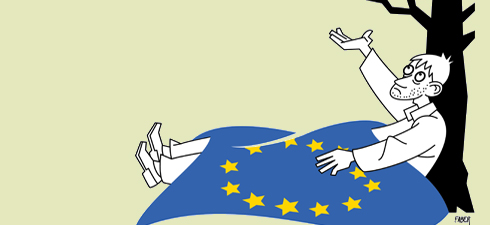"The European social model has already gone". Never has a central banker spoken with such brutality about the ongoing crisis. The remarks made by Italian Mario Draghi who has succeeded Jean-Claude Trichet at the head of the ECB, in a long interview with the Wall Street Journal on Friday 24 February, are so overwhelming in their implications that they probably could not have been published elsewhere than in the newspaper revered as the "bible" of global finance. Even Jean-Claude Trichet chose his words more carefully when attempting to explain what the future holds for the peoples of Europe.
For Mario Draghi, a former Goldman Sachs banker who now commands the fate of Europe’s single currency, the bid to save the euro will come at a high cost. Specifically, there will be "no escape" from tough austerity measures in all of the over-indebted countries; and this will necessarily involve giving up a social model based on job security and generous safety nets.
The model that provided the basis for European prosperity since the Second World War "has gone," argues Mario Draghi who reminds the WSJ journalist that the situation described in the famous quote from German economist Rudi Dornbusch — "the Europeans are so rich they can afford to pay everybody for not working” — no longer applies.
The ECB President’s remarks could be construed as provocative at a time when the European Central Bank is about to write a further €500 billion cheque for the banks, which, on Wednesday 29 February, will be offered unlimited credit as part of a further scheme to save the euro. In the light of such statements, how can he expect to face down increasingly vocal criticism of measures that sacrifice populations in order to save financial institutions?
However, the argument put forward Mario Draghi is incontrovertible: any “backtracking on fiscal targets [for debt reduction] would elicit an immediate reaction by the market” that would push up interest rates for sovereign states, making it even more difficult, or even impossible for them to clean up their books. This is what happened in Greece, and what almost happened in Portugal, Spain, and Italy.
An immediate and unflinching clean-up
We should also bear in mind that Mario Draghi’s remarks are obviously linked to the electoral schedule in Europe: in April in Greece, in May in France, and in the spring of 2013 in Italy, voters will be called on to choose their destiny. In explaining, like a modern-day Margaret Thatcher, that regardless of the outcome of these votes, new governments will have no alternative but to adopt stringent austerity policies, push through structural labour market reforms and further dismantle welfare systems, the ECB President aims to put an end to any ambiguity.
He further refuses to be swayed by any assertion that the current calm on the markets indicates that the crisis is over. Proof that this is not the case will be evident on Wednesday 29 February, when the banks will seek to obtain the ECB support without which the financial system would no longer be sustainable. Without cash injections from central banks — in the form of quantitative easing (QE) and a federal funds rate that is close to zero in the US, and the ECB’s Long Term Refinancing Operation (LTRO) in Europe — the entire financial system would collapse. Even China has been forced to bailout beleaguered banks. Welcome to the cruel realities of the new "QE world."
In adopting this harsh position, Mario Draghi intends to raise awareness of the fact that it is in our interest to accept an immediate and unflinching clean-up of balance sheets and the structural reforms required to restore market confidence rather than to embark on another decade fraught with the terrible pressure that results from the absence of that confidence. This is the strategy that has been adopted by Mario Monti, which has proved to be highly successful. In less than 100 days, the former Goldman Sachs advisor has permanently changed the face of Italy, which he has steered out of the eye of the storm. Other countries would do well to follow his example.
Reaction
Revive social model, don’t abandon it
For Die Wochenzeitung, the announced demise of the European social model is regrettable, and endangers Europe’s financial and political system. If the financial markets continue to do as they please and interest rates remain at the mercy of the rating agencies, aid to Greece will be totally ineffective and "the next peak of the crisis merely a matter of time," writes the left-wing Swiss weekly.
The only solution, in the weekly’s view, is the complete rejection of the demands of the EU-ECB-IMF troika and the restoration of Greek sovereignty over the national budget -
Objectives should be weighting of productivity and wage levels between countries. A European industrial policy aimed at a green and united Europe would be needed. Wealth and income distribution between classes, but also between countries in the eurozone, should be compensated for, for example through higher taxation of high salaries and wealth. The result would be greater equality of taxation in Europe, rather than just greater efficiency in Greece.
Was this article useful? If so we are delighted!
It is freely available because we believe that the right to free and independent information is essential for democracy. But this right is not guaranteed forever, and independence comes at a cost. We need your support in order to continue publishing independent, multilingual news for all Europeans.
Discover our subscription offers and their exclusive benefits and become a member of our community now!












